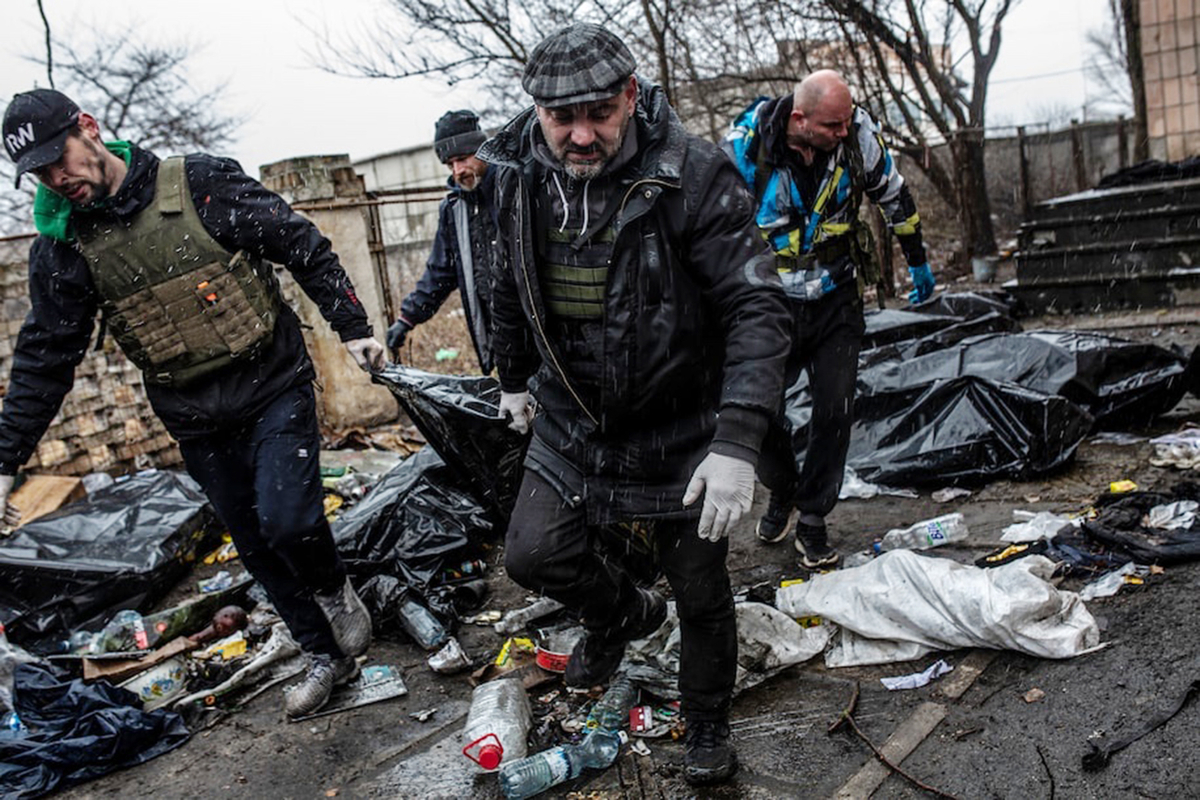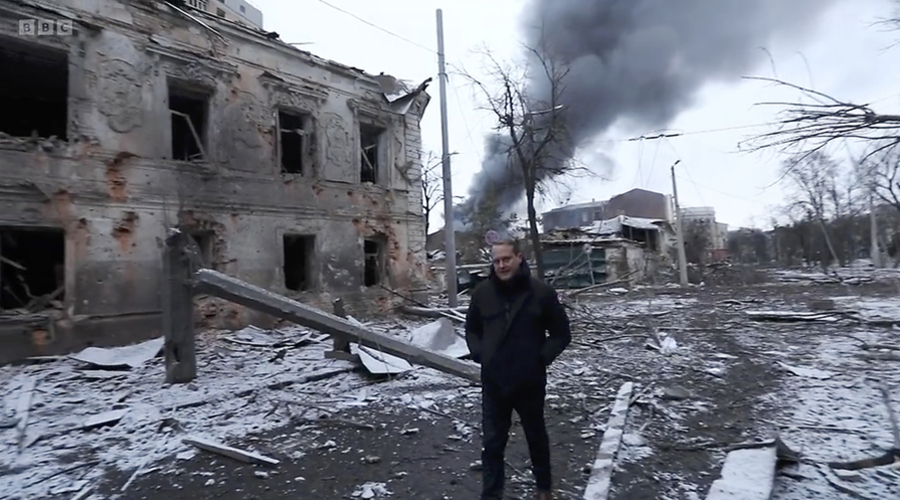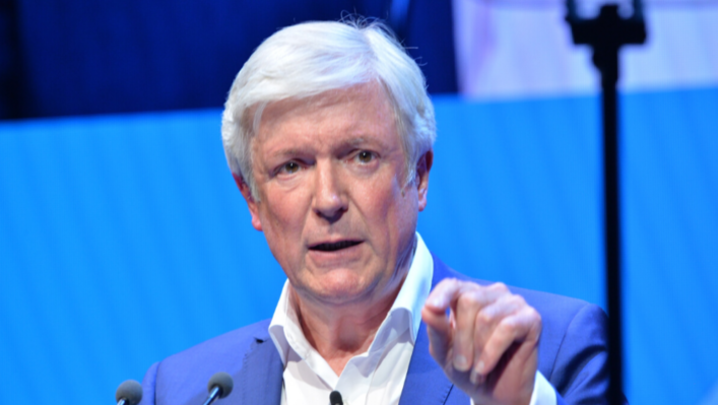News organisations go to great lengths to protect the mental health of the teams they send to conflicts such as Ukraine. Caroline Frost reports.
There are different kinds of fear,” says Quentin Sommerville, the BBC’s Middle East correspondent. “There’s the risk of getting kidnapped, the threat of roadside bombs and, here in Ukraine, the danger from shelling.”
Anyone who’s tuned in to Sommerville’s compelling TV and radio news reports from some of the most volatile areas of this conflict will realise that he is not exaggerating the threat to himself and members of his production crew. A fortnight ago, he was filming a piece to camera in the eastern city of Kharkiv, when Russian rockets began to fall, and the camera rolled as the team dashed for shelter.
While the work of Somerville, his crew and the hundreds of other journalists dispatched to Ukraine is crucial in telling the full military, political and people’s story of this war, the personal toll on these professionals’ mental health is not something any broadcaster carries lightly. Whether it’s preparing teams for deployment abroad, managing their welfare overseas or debriefing them on the return home, news organisations across the industry have developed an increasingly sophisticated system for protecting their staff’s mental health.
At the centre of the preparation for all staff who may be deployed to a war zone is HEFAT (hostile environment and first aid training). This lasts an initial five days, with a mandatory three-day refresher course every three years.
These courses provide a mixture of security and medical information, theory and practical exercises. They include sessions on planning, conflict management, dealing with hostile crowds and checkpoints, all the way through to ballistic awareness, psychological trauma awareness and hostage survival.
For Andy Brown, a camera operator and editor for Sky News who has just returned from Ukraine after three weeks working with correspondent Nick Martin, the value of HEFAT only became truly apparent out in the field. He explains: “Throughout the course, there’s a certain kind of gallows humour – they give the villages fake names that sound dangerous with scenarios that are bound to go wrong. You know it’s a fantasy world with a pub lunch.
“It’s only when you’re facing something in real life, you’re at a checkpoint in Ukraine, with a teenager pointing a gun at you, that you thank your lucky stars you’ve done that course. It equips you like muscle memory. You know the right things to say, to do and, most importantly, when to shut your mouth.”

Sommerville agrees that HEFAT and its follow-up refreshers are essential for giving confidence when reporting from the front line. “I’m about to do my fifth course. The medical training is very good. It’s easy to forget how to do a proper tourniquet.”
Managers are tasked with checking that their staff are psychologically prepared for anything they might face. A BBC mental health specialist refers to the BBC’s mantra that deployments into hostile regions are always voluntary, and the HEFAT course is one tool for the organisation to ensure that staff are aware of the challenges ahead and are thus deploying with a level of “informed consent”.
Sky News is equally vigilant. Brown describes how emails regularly arrived from managers, asking for any volunteers to go to Ukraine. “As soon as I said yes, my boss rang me up, wanting to have a conversation to make sure I knew exactly what was involved – how mentally taxing it would be, that we’d be on standby 24/7 for air raid sirens.
“We live in a secure bubble in the UK, and they need to know you’re psychologically prepared to visit a place where the worst things that can happen are actually happening. Then, your kit arrives nearer to departure, and it includes a bag of medical supplies and bullet-proof vests. That’s when you think, this is really happening.”
The high level of concern and support continues once staff are posted. HEFAT includes a catalogue of resources that can be accessed remotely, including support for medical needs, counselling and 24-hour emergency needs, including psychological trauma.
Additionally, the BBC runs specific courses for managers to highlight the importance of checking in with staff. The corporation’s mental health specialist adds: “Hostile environments are exceptionally demanding, with staff under pressure to provide good material who often neglect their health needs.
“There is a level of competitiveness and professional pride that can prevent staff from holding up their hands to say, ‘I’m finding things tough’. So we make sure managers engage and communicate well, to make sure it’s a safe space to admit if you’re finding work difficult.”
Of course, everyone is different, and Brown favours a more hands-off approach than some others, something his manager was able to accommodate. “He asked me how often I’d like to be checked up on, and I opted for once a week. During that chat, he asked, ‘How are you?’. I’d say, ‘Fine’, and then we’d pause. That pause can be the most important moment, because in it comes the truth. If my manager had felt anxious with anything he heard in that moment, he would have pulled me out immediately, but fortunately I always said enough to keep him happy.”
Brown, who has previously worked in Iraq and the Western Sahara, agrees people can have blind spots. “It’s far easier to recognise fatigue in someone else than it is in yourself. Everywhere you look, there are stories, and you can get wrapped up in it all and forget about yourself. It’s up to all of us to keep an eye on one another and to say, ‘Let’s go and have a chat.’
“You can’t spend that long being permanently on edge, it will break you, so you have to have gallows humour and somewhere to escape. Dangerous situations create bonds like no other.”
For Sommerville, who has been reporting from hostile regions since 2008, looking after himself while covering a conflict boils down to a straightforward, deliberately practical approach: “Focus on the work and don’t let your imagination run away with you. Take a deep, relaxing breath before checkpoints and smile.”
No one believes that the challenges of this kind of journalism come to an end with the flight home. The BBC is encouraging all staff returning from Ukraine to take a couple of days off to catch up on sleep and decompress, even before returning home to “normal” life.
All those returning are individually contacted by TRiM (trauma risk management) professionals and assessed for wellbeing. Managers are also trained to look for reactions and when to engage and explore whether staff should seek further specialist support.
The BBC’s mental health specialist adds: “It’s normal to be impacted by stories about human suffering. Most journalists go into the profession because they care and want to make a difference, so why wouldn’t they have emotional responses?
“We also acknowledge the impact of moral injury and vicarious trauma – impacting those staff not in Ukraine but talking to contributors, editing material, those finding the content harrowing and distressing.”
Andy Brown had a chat with his manager immediately on landing back in the UK – “it’s a very human need to debrief” – then took a week off.
He agrees it takes a few days to adjust to reality, particularly as he was still running an app he used in Ukraine to monitor air raids. “I was walking to a coffee shop when the app went off in my pocket. It snapped me right back, I started searching for cover until I caught myself. I clicked on the app, pressed mute and, with that, my work was done, for a while at least.”
For Sommerville, debriefing is simple: “Fresh air, family and Frank the dog. Delete Twitter and turn off work email. Sleep.”






